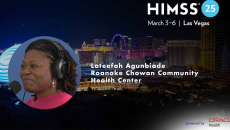Global
Brad Smith is the third person in the world to receive Neuralink's brain-computer implant and the first person with ALS.
HIMSS25
Population health data can help identify groups requiring specialized interventions and guide their treatments, according to Dr. Robert Jarve, Corewell Health's associate chief medical officer and Davies Award recipient.
Via Datavant's data utility and privacy platform, Boehringer Ingelheim can evaluate data and streamline data discovery.
Via Datavant's data utility and privacy platform, Boehringer Ingelheim can evaluate data and streamline data discovery.
Project Stargate, an initiative to enhance U.S. AI infrastructure, is exploring international expansion, particularly in the UK.
Project Stargate, an initiative to enhance U.S. AI infrastructure, is exploring international expansion, particularly in the UK.
HIMSS25
Amid rising cyberattacks, Michael Gross, Cleveland Clinic's manager of cybersecurity intelligence, says third-party vendors present an inherent risk that is difficult to defend against, making internal preparedness crucial.
Serve You Rx members will have maintenance meds delivered to their home and access to online services, including automatic refills and a pharmacist.
Serve You Rx members will have maintenance meds delivered to their home and access to online services, including automatic refills and a pharmacist.
HIMSS25
Based on learnings from a HIMSS CIO Connect session, Lateefah Agunbiade of Roanoke Chowan Community Health Center was able to collaborate with her organization's CFO to gain support for a digital modernization initiative.









